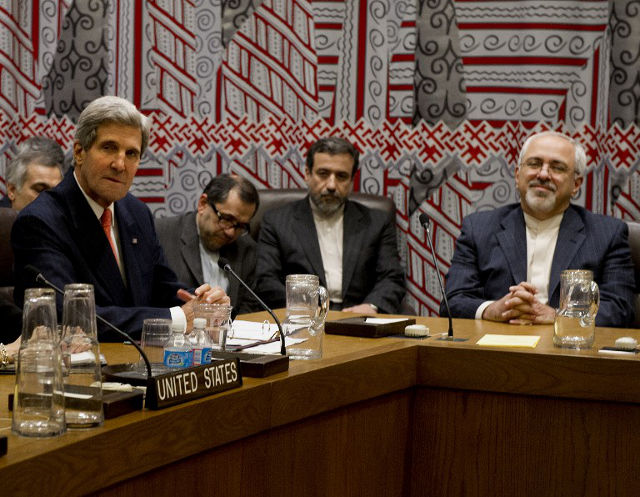SUMMARY
This is AI generated summarization, which may have errors. For context, always refer to the full article.

UNITED NATIONS (2ND UPDATE) – Iran said Thursday it hoped to seal a deal on its nuclear program within a year as its foreign minister held historic talks with US Secretary of State John Kerry.
Kerry shook hands and met briefly one-on-one with a smiling Foreign Minister Mohammad Javad Zarif on the sidelines of the United Nations in one of the foes’ highest-level encounters since the 1979 Islamic Revolution.
The top US diplomat pulled his Iranian counterpart aside saying “shall we talk for a few moments” after a meeting between Iran and six world powers that aimed to revive long-stalled negotiations over Tehran’s disputed nuclear program, a US official said.
They met alone with no note-takers for about 30 minutes.
The US-educated Zarif, tapped by new moderate President Hassan Rouhani to lead the nuclear dossier, said the talks agreed to “jumpstart” work on a deal and “move towards finalizing it, hopefully, within a year’s time.”
“I thought I was too ambitious, bordering on naivete, but I saw that some of my colleagues were even more ambitious and wanted to move faster,” Zarif told a think tank forum as he joined Rouhani on one of a slew of appearances during his week in New York.
Kerry said he and his counterparts from the great powers contact group found Zarif’s 20-minute presentation “very different in tone, and very different in the vision that he held out with respect to the possibilities in the future.”
Nuclear talks will resume on October 15 and 16 in Geneva, boosting hopes Iran will bring tangible proposals to the table on how to move forward as the West seeks to rein in its atomic program.
It was an extraordinary contact between the two countries that have had no diplomatic relations since 1980, when Iranian students stormed the US embassy in Tehran and held hostages for 444 days after the revolution that toppled the pro-Western shah.
It is the first time that ministers of the two countries have sat together at talks on Iran’s nuclear program, which Tehran says is for peaceful purposes but Western officials fear could be a covert grab for an atomic bomb.
Rouhani swept to power in June elections on promises to ease the nuclear-related tensions with the West, which have led to tough sanctions that have caused severe economic pain in Iran.
Rouhani, a moderate cleric who replaced the firebrand Mahmoud Ahmadinejad, said Iran was committed to negotiate in “good faith.”
“We are fully prepared to seriously engage in the process toward a negotiated and mutually agreeable settlement and do so in good faith and with a business-like mind,” Rouhani told the think tank forum.
Kerry pledged to remain cautious, saying “there’s a lot of work to be done” with plenty of questions still remaining about Iran’s nuclear program.
“Needless to say one meeting and a change in tone, which was welcome, doesn’t answer those questions yet,” Kerry said.
But speaking separately to CBS News, Kerry said Iranian hopes for a quick deal — and relief of sanctions — were possible.
Asked about Rouhani’s earlier statement that a deal could take place in six months, Kerry said: “It’s possible to have a deal sooner than that depending on how forthcoming and clear Iran is prepared to be.”
Tensions with Israel
Israeli Prime Minister Benjamin Netanyahu has, however, urged skepticism of Rouhani’s overtures, calling him “a wolf in sheep’s clothing” who is using charm to hide a bomb program.
Netanyahu, who has not ruled out a military strike on Iran, meets next week with US President Barack Obama, who aides said was willing to meet Rouhani until the Iranian side demurred.
Rouhani has kept up Iran’s criticism of Israel, but in repeated US media interviews condemned the Holocaust, distancing himself from Ahmadinejad whose revisionist statements incensed the Jewish state.
In an address to a UN conference on disarmament, Rouhani called on Israel to sign the nuclear Non-Proliferation Treaty. Israel is widely believed to have a nuclear program but does not acknowledge it.
“As long as nuclear weapons exist, the risk of their use, threat of use and proliferation persist. The only absolute guarantee is their total elimination,” Rouhani said.
A State Department official, meanwhile, cautioned that it was early days yet and the “devil is in the details.”
Zarif made a “thoughtful presentation” which laid out “their desire to come to an agreement fully implemented within a year’s time,” the official said.
Until the teams get “down to work at an expert level to know … what they are willing to do in concrete terms, we have a good atmosphere, but we don’t have a result yet,” the official added.
EU foreign policy chief Catherine Ashton organized the talks with Zarif, which involved the foreign ministers of the five permanent members of the UN Security Council — Britain, China, France, Russia and the United States — as well as Germany. – Rappler.com
Add a comment
How does this make you feel?
There are no comments yet. Add your comment to start the conversation.